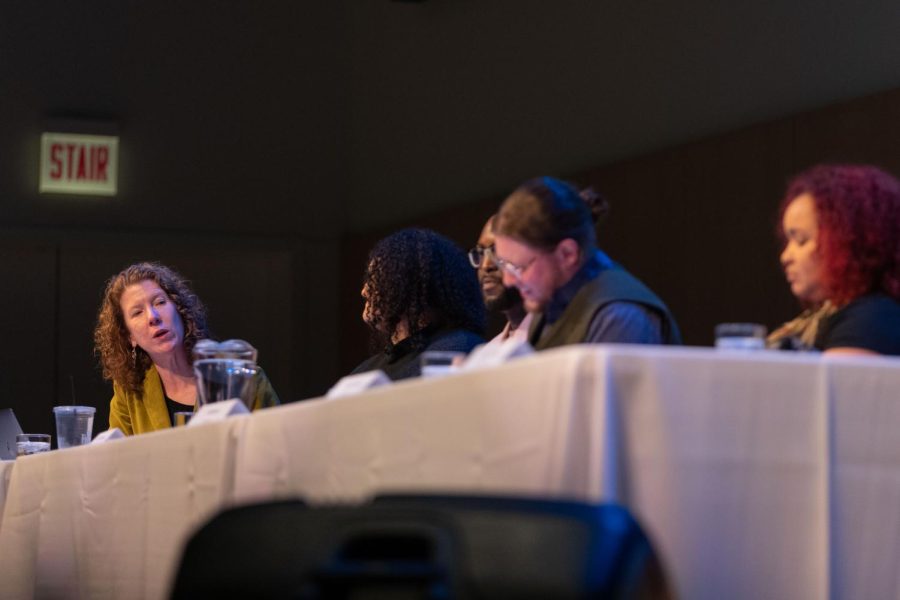Antiracism Transformation Team announces effort to survey campus community about racial climate
The college’s Antiracism Transformation Team is asking members of Columbia’s community how racism impacts people on campus, a key initiative for the group, which is tasked with leading the college to make long-term structural and institutional changes.
The team of students, alumni, full and part-time faculty and staff members, which started meeting for the first time at the beginning of 2021, hosted a panel Wednesday March 22 at the Student Center to discuss bias and discrimination reporting and its plans to conduct a survey to understand the racial climate on campus.
Llexxi Youngs, an ArTT fellow, the name for the groups members, said that frequently she is the only Black woman in her classes. The senior film and television major said that she can count on her hand how many Black teachers she has had at the college in addition to difficulty feeling support from her white teachers at Columbia.
“It’s been really tough having to explain like, why I made my character Black,” Youngs said, referring to class projects. “The diversity here is very there, it’s just the fact that we’re hidden behind other barriers.”
Jessica Meharry, director of academic DEI and associate professor in the Business and Entrepreneurship Department, emphasized that college is only in the planning stages of its efforts.
“A lot of these things you’re hearing are our ideas,” Meharry said. “These are our recommendations but now it’s like what does that work look like?” She said the furthest the group has gotten is the idea for a climate survey, which helps colleges and universities measure their strengths and weaknesses around diversity, inclusion and equity on their campuses.
Rachel Horton, director of student persistence and ArTT fellow, introduced the campus climate survey at the panel event.
“In doing this, we hope that it just really will uncover any stories that are missed,” Horton said during the panel.
Horton said that ArTT plans to look at potential third-party vendors to conduct the survey over the summer and ideally would distribute the survey in November and then release the findings in spring of 2024. The survey will be accessible to students, faculty and staff.
With the college’s recent disclosure that 67 percent of the freshmen who did not return after the Fall 2022 semester were students of color, Horton said “we have to do more.”
“At some point we have to say we know there are things that are working well, but let’s be honest, we know there’s challenges,” Horton said. “We have to do better to make sure we have the structure in place to support them, to celebrate their strengths and to utilize them,”
Youngs said that she hopes to hear more stories from people from a variety of backgrounds in the campus climate survey.
“I hope that those stories unlock something…there are people here that we don’t know about [their experiences] and I hope that we can find them and start listening to voices that we have not heard yet in Columbia.”
Charlesa Thompson, a sophomore user experience and interaction design major, came to the panel discussion after hearing about it from a friend.
“I appreciate how there were students on the board this time, this is probably one of the first panels where students were actually on the panel,” Thompson said.
During the Q&A portion of the panel, Thompson asked what Columbia is doing for non-Black instructors and students to not be afraid to talk about Black and African experience in the classroom below surface level.
Meharry asked Thompson to talk to ArTT after the panel was over. Thompson later told the Chronicle that Meharry asked her to help the organization to talk to instructors.
“It’s not that I wasn’t satisfied, it’s just I know when words sound really beautiful,” Thompson said. “I love really pretty words and I love ‘what ifs’ and ‘this is going to happen’ but I need to see actual action because I’m paying to go to this school. None of us are paying a small fee.”
Columbia’s President and CEO Kwang-Wu Kim, who was at the panel as an audience member, said the college has been working on antiracism efforts since he started working at the college in July 2013.
aedwards@columbiachronicle.com
asergazina@columbiachronicle.com
arichardson@columbiachronicle.com
Abra Richardson is a senior photojournalism major and has covered Chicago music festivals, fashion and metro...
kjackson@columbiachronicle.com
K'Von Jackson is a senior photography major. Some of his work includes campus crime writing, social justice...


